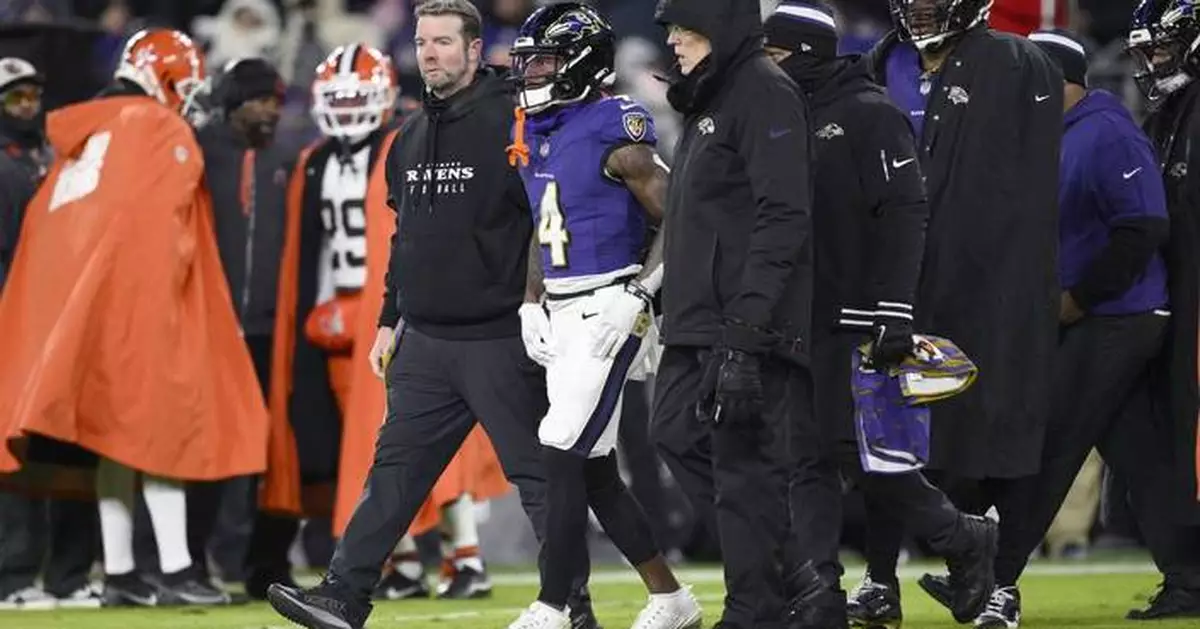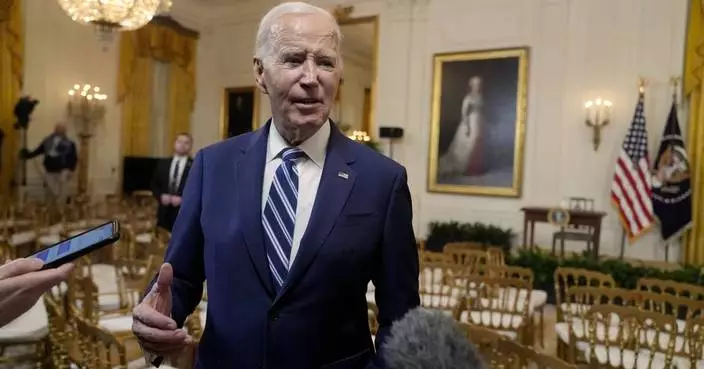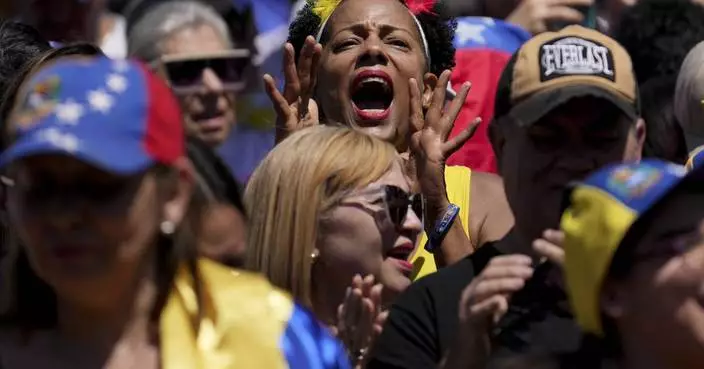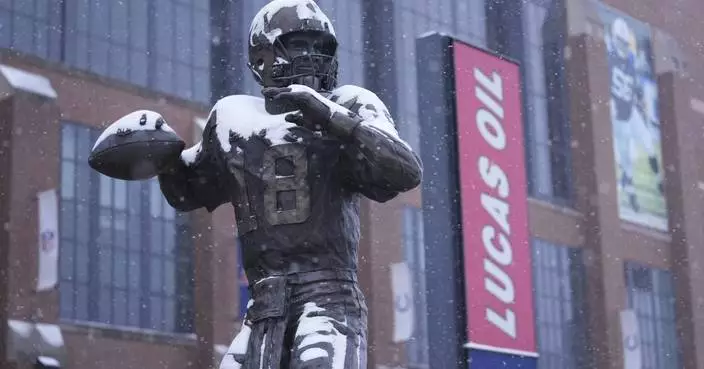BALTIMORE (AP) — The last thing the Baltimore Ravens needed in their regular-season finale was a major injury. They're hoping Pro Bowl receiver Zay Flowers avoided one.
Flowers left Baltimore's 35-10 win over Cleveland on Saturday with a right knee injury. The second-year wide receiver began grabbing at his right leg after a short catch-and-run in the second quarter. It appeared he may have been hit on the knee by Cleveland's Mohamoud Diabate.
Flowers eventually was able to get up and walk gingerly off the field, but the injury is a concern for the playoff-bound Ravens.
“It's something that he has a chance to be OK with, but we'll probably have more details after an MRI tomorrow morning,” coach John Harbaugh said.
Flowers has given Baltimore much-needed production from the receiver spot this season, catching 74 passes for 1,059 yards and four touchdowns. The 5-foot-9 Flowers occasionally puts his shiftiness to use in the running game as well.
The Ravens clinched the AFC North title with the win over Cleveland, so it wasn't a situation where they were likely to hold top players back to protect them from injury.
AP NFL: https://apnews.com/hub/nfl
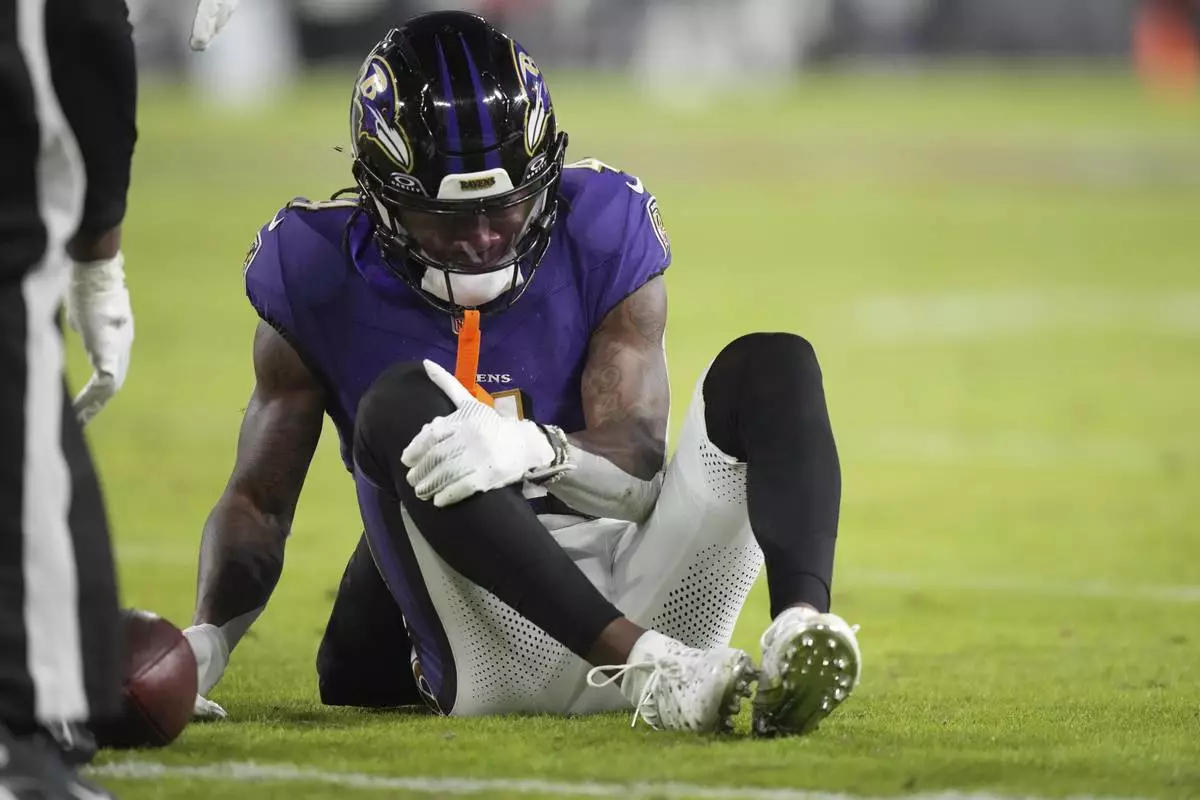
Baltimore Ravens wide receiver Zay Flowers grabs his leg after being injured during the first half of an NFL football game against the Cleveland Browns Saturday, Jan. 4, 2025, in Baltimore. (AP Photo/Stephanie Scarbrough)
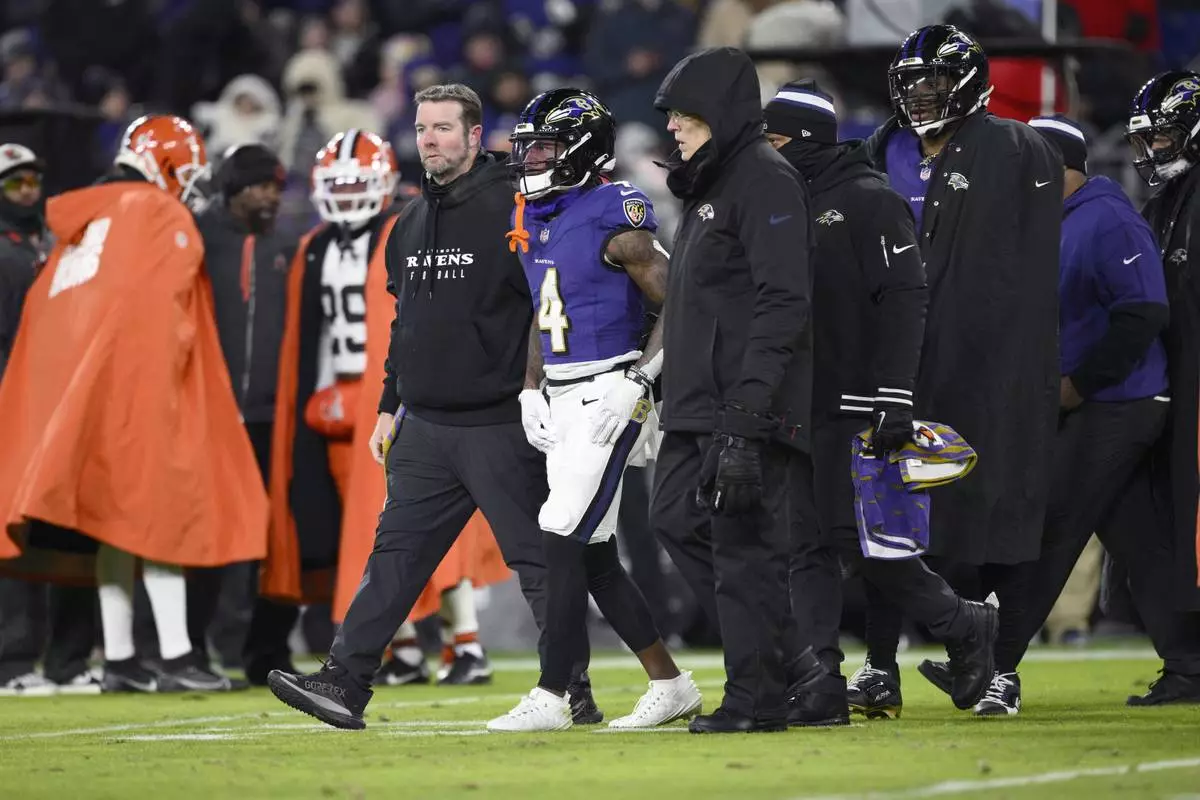
Baltimore Ravens wide receiver Zay Flowers is helped off the field after being injured during the first half of an NFL football game against the Cleveland Browns Saturday, Jan. 4, 2025, in Baltimore. (AP Photo/Nick Wass)
WASHINGTON (AP) — It's the largest prosecution in Justice Department history — with reams of evidence, harrowing videos and hundreds of convictions of the rioters who stormed the U.S. Capitol on Jan. 6, 2021. Now Donald Trump's return to power has thrown into question the future of the more than 1,500 federal cases brought over the last four years.
Jan. 6 trials, guilty pleas and sentencings have continued chugging along in Washington's federal court despite Trump's promise to pardon rioters, whom he has called “political prisoners" and “hostages” he contends were treated too harshly.
Here's a look at where the prosecutions stand on the fourth anniversary of the Capitol riot and what could happen next:
More than 1,500 people across the U.S. have been charged with federal crimes related to the deadly riot. Hundreds of people who did not engage in destruction or violence were charged only with misdemeanor offenses for entering the Capitol illegally. Others were charged with felony offenses, including assault for beating police officers. Leaders of the Oath Keepers and the Proud Boys extremist groups were convicted of seditious conspiracy for what prosecutors described as plots to use violence to stop the peaceful transfer of power from Trump, a Republican, to Joe Biden, a Democrat.
About 250 people have been convicted of crimes by a judge or a jury after a trial. Only two people were acquitted of all charges by judges after bench trials. No jury has fully acquitted a Capitol riot defendant. At least 1,020 others had pleaded guilty as of Jan. 1.
More than 1,000 rioters have already been sentenced, with over 700 receiving at least some time behind bars. The rest were given some combination of probation, community service, home detention or fines.
The longest sentence, 22 years, went to former Proud Boys national chairman Enrique Tarrio, who was convicted of seditious conspiracy along with three lieutenants. A California man with a history of political violence got 20 years in prison for repeatedly attacking police with flagpoles and other makeshift weapons during the riot. And Oath Keepers founder Stewart Rhodes is serving an 18-year prison sentence for seditious conspiracy and other offenses.
More than 100 Jan. 6 defendants are scheduled to stand trial in 2025, while at least 168 riot defendants are set to be sentenced this year.
Authorities have continued making new arrests since Trump's election victory. That includes people accused of assaulting police officers who were defending the Capitol.
Citing Trump's promise of pardons, several defendants have sought to have their cases delayed — with little success.
In denying one such request, U.S. District Judge Royce Lamberth, who was nominated to the bench by President Ronald Reagan, a Republican, wrote: "This Court recently had the occasion to discuss what effect the speculative possibility of a presidential pardon has on the timetable for a pending criminal matter. In short: little to none."
One defendant who convinced a judge to postpone his trial, William Pope, told the court that the “American people gave President Trump a mandate to carry out the agenda he campaigned on, which includes ending the January 6 prosecutions and pardoning those who exercised First Amendment rights at the Capitol.” Pope has now asked the judge to allow him to travel to Washington to attend Trump's inauguration on Jan. 20.
Trump embraced the Jan. 6 rioters on the campaign trial, downplaying the violence that was broadcast on live TV and has been documented extensively through video, testimony and other evidence in the federal cases.
Trump has vowed to begin issuing pardons of Jan. 6 rioters on his first day in office. He has said he will look at individuals on a case-by-case basis, but he has not explained how he will decide who receives such relief.
He has said there may be “some exceptions" — if “somebody was radical, crazy." But he has not ruled out pardons for people convicted of serious crimes, like assaulting police officers. When confronted in a recent NBC News interview about the dozens of people who have pleaded guilty to assaulting law enforcement, Trump responded: “Because they had no choice."
Many judges in Washington's federal court have condemned the depiction of the rioters as “political prisoners," and some have raised alarm about the potential pardons.
"No matter what ultimately becomes of the Capital Riots cases already concluded and still pending, the true story of what happened on January 6, 2021 will never change," Judge Lamberth recently said in a statement when handing down a sentence.
U.S. District Judge Carl Nichols, who was nominated to the bench by Trump, has said it would be “beyond frustrating and disappointing” if Trump hands out mass pardons to rioters.
In another case, U.S. District Judge Amit Mehta alluded to the prospect of a pardon for Rhodes, the Oath Keepers founder convicted of seditious conspiracy.
“The notion that Stewart Rhodes could be absolved of his actions is frightening and ought to be frightening to anyone who cares about democracy in this country,” said Mehta, who was nominated by President Barack Obama, a Democrat.
Follow the AP's coverage of the Jan. 6 insurrection at https://apnews.com/hub/capitol-siege.
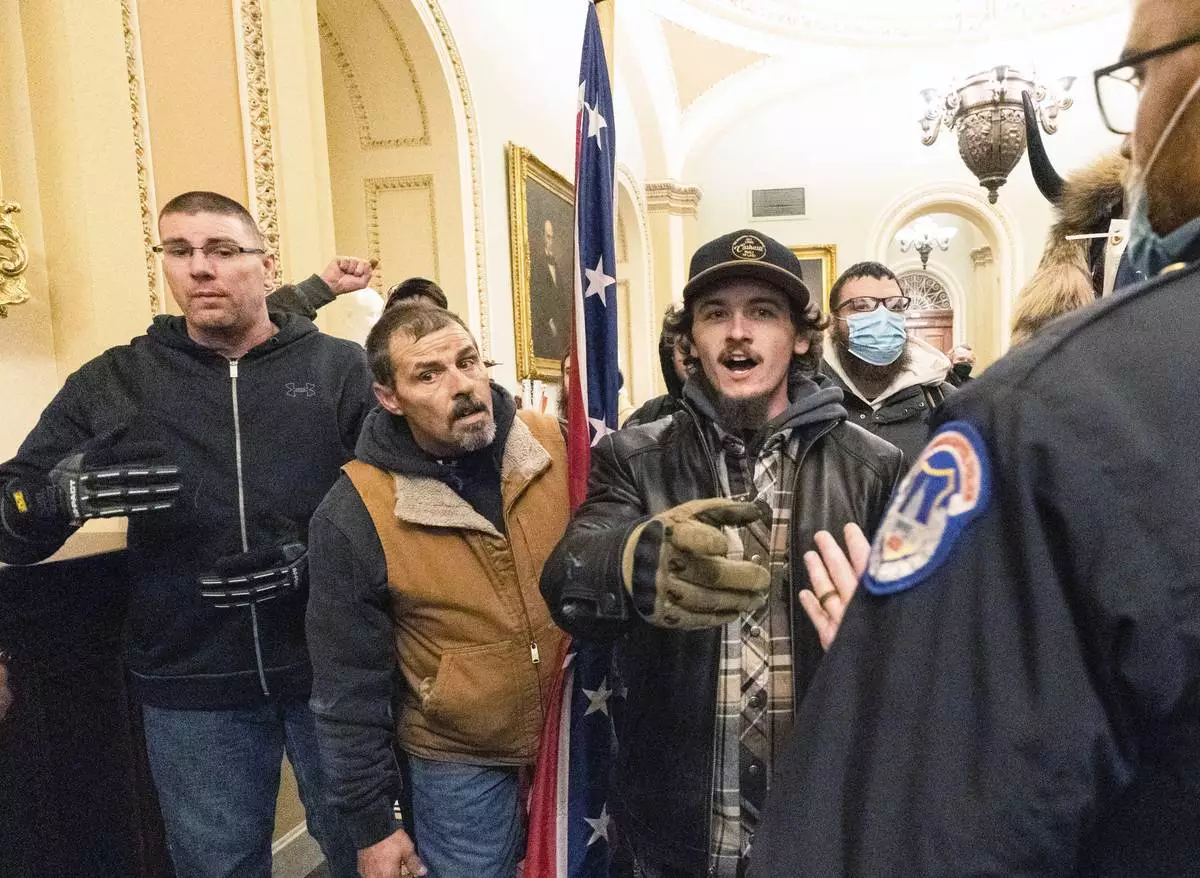
FILE - Violent protesters loyal to President Donald Trump, including Kevin Seefried, center, holding a Confederate battle flag, are confronted by U.S. Capitol Police officers outside the Senate Chamber inside the Capitol, Jan. 6, 2021 in Washington. (AP Photo/Manuel Balce Ceneta, File)
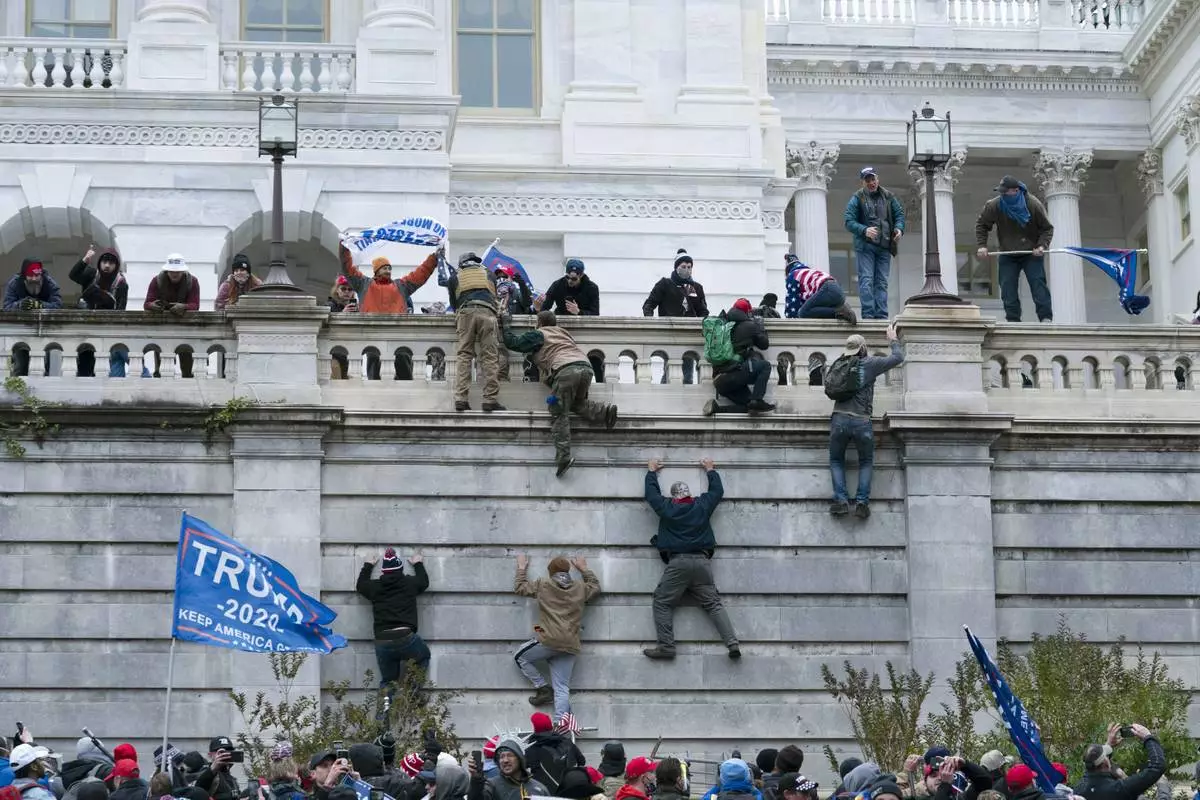
FILE - Supporters of President Donald Trump climb the west wall of the the U.S. Capitol in Washington, Jan. 6, 2021. (AP Photo/Jose Luis Magana, File)
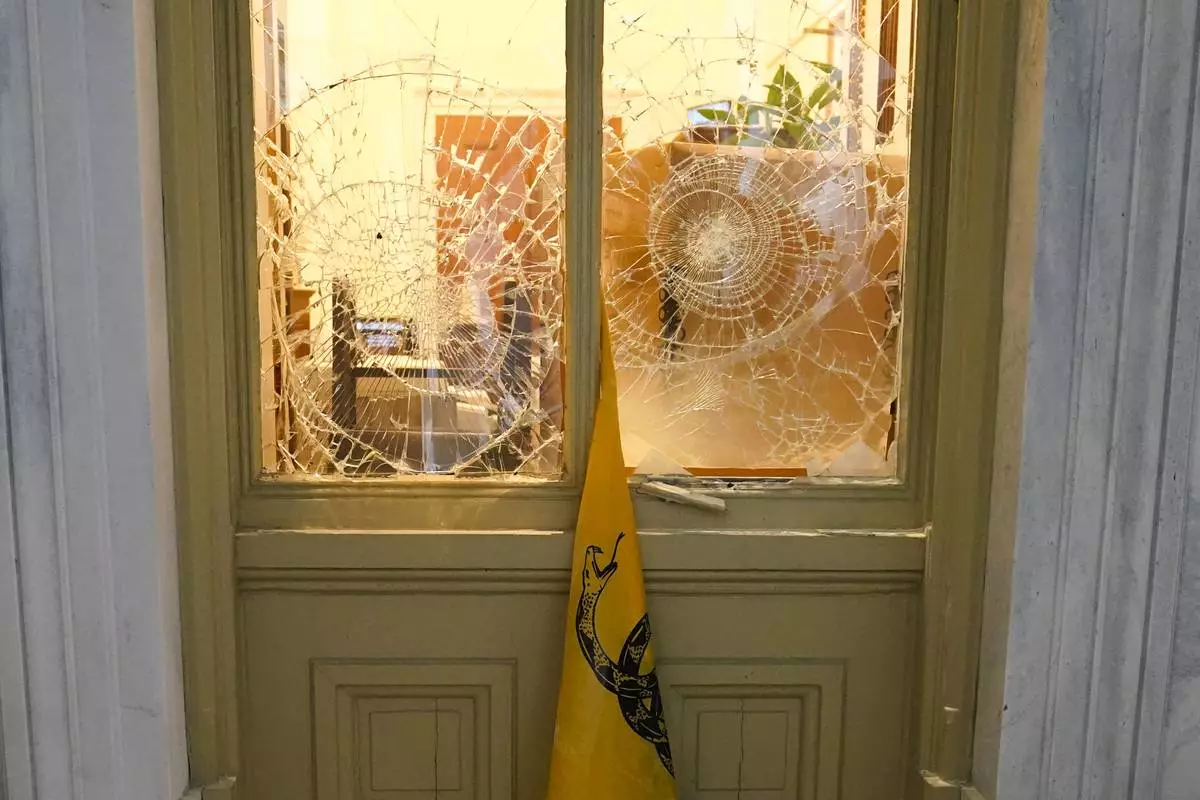
FILE - A flag hangs between broken windows after then-President Donald Trump supporters tried to break through police barriers outside the U.S. Capitol, Jan 6, 2021. (AP Photo/John Minchillo, File)
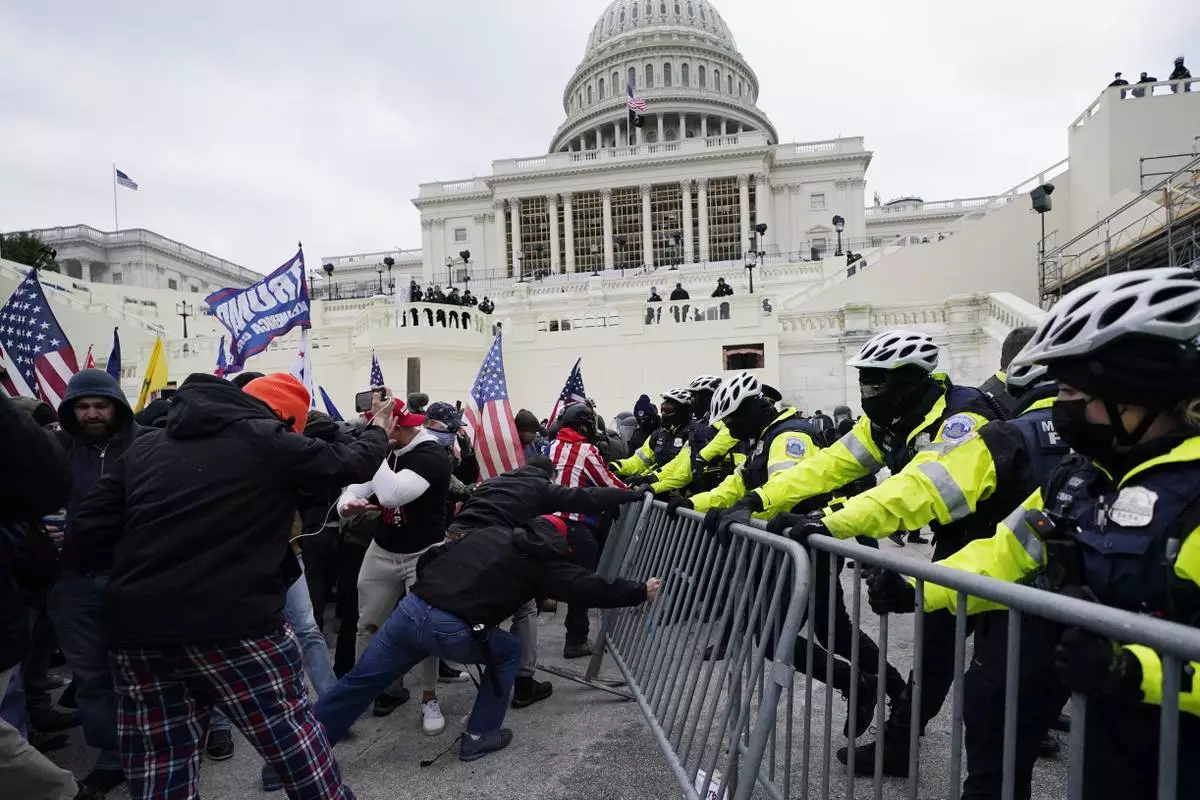
FILE - Insurrectionists loyal to President Donald Trump try to break through a police barrier, Wednesday, Jan. 6, 2021, at the Capitol in Washington. (AP Photo/Julio Cortez, File)




